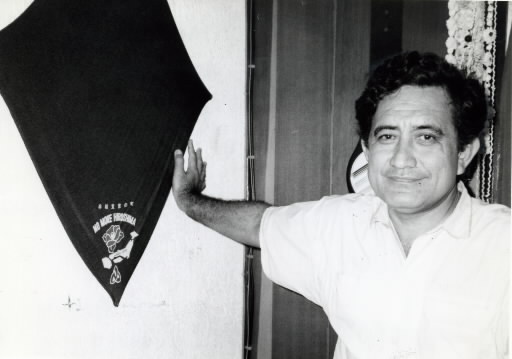6. Campaigning for Independence and an End to Testing
Feb. 15, 2013
Chapter 3: The Central, South Pacific and Australia
Part 3: The French Cover-up in Polynesia
Part 3: The French Cover-up in Polynesia
Information about French activities at Moruroa has been tightly controlled since the first test was carried out in 1966. In spite of this, the Polynesians have been actively resisting French attempts to continue their nuclear testing program in the Pacific.
On the main road linking Papeete to the international airport, the sign Faa'a Oire Patoi Atomi Manava (Welcome to the Nuclear-free City of Faa'a) broadcasts the antinuclear feeling of Faa'a's citizens to all who visit. Faa'a is the largest city in French Polynesia, with a population of twenty-four thousand. In 1985 it declared itself a nuclear-free zone, and the sign was erected.
We visited the mayor of Faa'a, Oscar Temaru, at his small, single-story city offices. The mayor is also the leader of the Polynesian Liberation Front formed in 1976, which is campaigning for independence from France and an end to the underground tests. He witnessed tests at Moruroa during his time working as a customs official. "Before the tests began," he told us, "nobody in Polynesia, including myself, of course, knew what radiation was or how destructive it could be. The French told us nothing." His tone was even but his anger apparent.
Damage wrought by the tests on the natural surroundings strengthened Temaru's determination to campaign against the French. Temaru was elected for his first term as mayor of Faa'a in 1983. In 1986 he was chosen as a member of the Territorial Assembly, which has a total of forty-one members, and he drew sixty percent of the vote in the 1989 mayoral elections to win another term. Although Temaru carries the weight of public opinion behind him in his fight against the French, there are many obstacles in his way. He has had to deal with the secrecy of the French government, harassment of the anti-testing movement, the shortage of Polynesian scientists and doctors, and a dearth of information regarding radiation and nuclear weapons. His biggest problem is the scattered nature of the islands themselves, which makes it difficult to organize resistance among victims of radiation. The media also is largely controlled by French interests; there are only two newspapers in Tahiti, both are written in French, and the contents tend to be pro-French as well.
The Liberation Front holds three main events during the year for the public—the antinuclear meetings on Bikini Day in March and on Hiroshima Day in August, and the memorial service for Oopa, father of the independence movement, held on May Day. According to Temaru, none of these events has ever been reported by the local French media.
The group has invited doctors and other specialists from Australia and Japan to the islands in attempts to uncover some facts about radioactive contamination, and has sent representatives to antinuclear conferences in Hiroshima. With help from Faa'a city they have also started an antinuclear radio station which broadcasts information on nuclear issues. All the group's actions are monitored by the French authorities, who clamp down on them from time to time when they feel that they have gone too far out of line. The bombing of the Greenpeace vessel Rainbow Warrior in Auckland harbor in New Zealand on the night of July 10, 1985, is a classic example of attempts to obstruct antinuclear activities. The ship was destroyed just prior to setting out on a protest voyage to Moruroa, and one person was killed. It was discovered that this crime had been perpetrated by two members of the French secret service, who were arrested soon after. In spite of international criticism over the Rainbow Warrior affair, as it later became known, France chose to continue the tests.
Since testing began, the French answer to Polynesian doubts about radiation has been restricted to two worn-out phrases: "it's safe" and "there is nothing to worry about." The question which not only the Liberation Front but the whole of Polynesia has been asking the French government is, "If it's so safe, why don't you do it in France?" Temaru believes that there will only be an end to atomic bomb testing in the Pacific when Polynesia succeeds in becoming independent from France. To him, opposition to the testing and Polynesian independence are inextricably linked.







